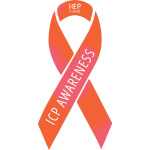ICP Awareness Day Date in the current year: June 10, 2026
 ICP Awareness Day is observed annually on June 10. The day was created to educate the public about intrahepatic cholestasis of pregnancy (ICP), a high-risk condition that can result in stillbirth if left untreated.
ICP Awareness Day is observed annually on June 10. The day was created to educate the public about intrahepatic cholestasis of pregnancy (ICP), a high-risk condition that can result in stillbirth if left untreated.Cholestasis is a condition in which bile does not flow properly from the liver to the duodenum. Depending on the location of the bile flow obstruction or impairment, there are two types of cholestasis: intrahepatic, which occurs within the liver, and extrahepatic, which occurs outside the liver.
Intrahepatic cholestasis of pregnancy (ICP), also known as cholestasis of pregnancy, jaundice of pregnancy, obstetric cholestasis, or prurigo gravidarum, is a type of cholestasis that occurs during pregnancy, most commonly in the third trimester. Its incidence ranges from around 1% in Western Europe, North America, and Asia to 15% in some parts of South America. This variability is believed to be due to genetic predisposition and other factors.
Cholestasis may occur during pregnancy because elevated estrogen and progesterone levels may affect bile transport through the liver. Women who develop ICP have a genetic predisposition; however, not all women with the predisposition will develop ICP. Some women develop ICP during one pregnancy but not the next. Environmental factors are believed to play a role in its development, but this role is poorly understood.
The main symptom of ICP is itching without a visible rash, which is caused by high bile acid levels. The location and intensity of the itching can vary and does not correlate with the severity of ICP. Less common symptoms include pain in the liver area (under the right ribs), dark urine, pale or greasy stools, fatigue, increased nausea, loss of appetite, and jaundice (in fewer than 10% of cases).
Women with ICP are at an increased risk for developing gestational diabetes or preeclampsia. Risks for the fetus include meconium passage in utero, preterm labor, and stillbirth. Meconium, the newborn’s first stool, is normally passed after birth. In rare cases, however, it can be released into the amniotic fluid while the baby is still in the womb. If the baby inhales it, it can cause a condition called meconium aspiration syndrome.
ICP is diagnosed through blood tests. Management focuses on reducing maternal symptoms and minimizing risks for the fetus. It consists of three main parts: monitoring, medication, and planned early delivery. Monitoring includes regular bile acid and liver function tests for the mother, as well as non-stress tests and ultrasounds for the fetus. The primary medication for ICP is ursodeoxycholic acid (UDCA), which improves bile flow and relieves itching. Planned early delivery reduces the risk of stillbirth. After delivery, ICP usually resolves within days to weeks.
ICP Awareness Day was established by ICP Care, a nonprofit organization whose mission is to support and educate pregnant women affected by ICP and ensure healthy deliveries. Donna Benavides founded ICP Care after losing her firstborn son, Jorden, to ICP on June 10, 2003. The date of ICP Awareness Day was chosen in his honor.
- Category
- International Observances
- Tags
- ICP Awareness Day, international observances, awareness days, intrahepatic cholestasis of pregnancy, pregnancy complications